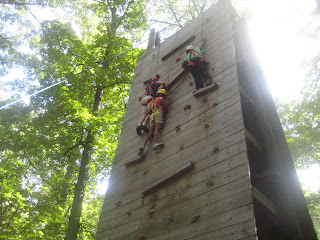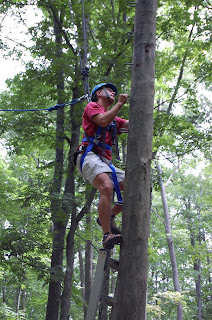The iconic tower in the idyllic mountainside of Hotsprings — a perfect location to hold our opening residency for our Executive MBA program.
The Ropes Course
Whoever thought that getting your MBA would require you to do anything physical? (After all, we are budding entrepreneurs not warriors, leaders not infantry recruits.)
Not least of which requires a physically challenging (and mentally stimulating) adventure in the woods.
The Outdoor Orientation Experience or more colloquially known as the “Ropes Course.” was a nice break from two days of thought provoking classroom discussion.
So today, at 0900 (after stuffing in a huge three-course hot/continental breakfast), the George Washington University (GWU) EMBA Class of 2011 trekked off somewhere in the edges of the wooded Allegheny Mountains within the serene and therapeutic Homestead preserve in idyllicHot Springs, VA
We were going to take a class that didn’t require powerpoint or pointers, but still had everything to do with leadership development and more.
Because the truth is, you can’t learn management just in a classroom. As Charles Handy, one of the world’s most influential business thinkers said,
“You can bring the world into a classroom, but you can’t replicate it there.”

Our first glance at the 40-foot wall — seemed insurmountable but we were determined to conquer it.
The perfect metaphor for problem solving.
The Ropes Course is a metaphor for problem solving — it challenges us to face our fear. The key to surviving is teamwork — being supported and supporting.
Often in life we face obstacles in work and life. The key to responding to these obstructions is to face them head=on and to rely on the support from other people.
Team members assist each other donning our harnesses — the one crucial piece of equipment that would ensure our safety and protection.
The Tower
The first task for many was to climb this 40-foot wall in tandem (3 to a team)
Teammates (Belay teams) yell “Climb on” and encourage our crew as they climb up together.
Almost to the top — it’s not skill as much as coaching and teamwork that will get you there.
As Marilyn, our facilitator, said, “This tower is about teamwork. We are going to have to work together to solve our problems — the problems of the day or the problems of the next five years.”
The rope handlers keeping a close eye on the team, coaching them with support and precision so that the 3-member team can climb up to the top together and then work in coordination to bring our crew the back home.
The Belay teams keep a close eye and a taut line, but they can not pull the crew up the wall. They are going to have to figure this out amongst themselves.
Note: As the climbers moves up the wall and then back down, the belayer must remove the slack from the rope by paying out or pulling in the excess.
Bringing our teammates home. Perhaps, this is the most enjoyable part of the event.
The Telephone Pole

Mike climbing up the telephone pole with ease, albeit this is actually the easy part. It’s all uphill from here.
Senodja, our token Soldier, showing what it takes to maintain steady balance on a rotating disc that just wants to throw you off, if you’re not looking.
The challenge here is to stand up on the rotating disc maintaining balance, and yes, poise. (After all, we’re all grad students).
As Ron said, “Keep your eyes on the horizon, not the ground. The horizon appears stable. The ground is shaking.”
Sam the Tarzan, leaping for the rope with finesse. Here you need to have faith that your three belay teams will keep a steady hold of the rope and then will lower you down gradually and ease.
Senodja ecstatic that the tower climb is done and she is back safely on ground.
The last part of the ropes course required two teams to balance a helium stick , a long, light rod on two index fingers and to bring it down to the ground smoothly (despite the fact that it wanted to instinctively rise up on its on like a balloon).
Mysteriously, the stick had a tendency to rise up on its own despite the force of gravity and 10 people all adding pressure to bring the stick down colletively.
Not surprisingly, the more the group tries, the more the stick floats up adding to the paranoia and to the facilitators, calm amusement.
The challenge here was to work in unison (and not point fingers at your teamworks)
So what a tremendous day — we made it. Not only did we survive, but we learned or developed some very important leadership skill sets that we would surely come in handy in the immediate future.
Quantico, FBI Academy, BUDS (Basic Underwater Demolitions/SEAL)– here we come — the EMBA Class of 2011.
“You ain’t seen nothing yet.”
What Else I Learned at the Five Day Retreat:
It is my desire to fully discover myself while enrolled in the Executive MBA program. First, I have a strong desire to develop a deeper understanding of the complexities of conducting business in a global business environment.
Second, I want to explore creative ways how I can best explore my inner talents and interests while having fun doing it. As part of my personal vision exercise I discovered that my strengths are writing, multi-tasking and social interactions. As part of my Belbin team role questionnaire, I discovered that I am a “Resource Investigator” and “Team-worker.”
Further Explanation of Team Roles:
The Resource Investigator provides the team encouragement and enthusiasm but is also keeps a finger on the pulse of the outside world.
A Team-worker is the lubricant that keeps the team machine pistons pumping. They are diplomats, listeners, but may not be very willing to take sides in an argument.
The overlying distinction with the Belbin test over others is that it focuses on how one performs in a team environment.
In addition, based on retaking a Myers-Briggs Type Indicator test, I learned that I am mostly anESTP (Extraversion, Sensing, Thinking, Perception). I am enthusiastic, extroverted, resourceful, witty, gregarious and quick to take action.



